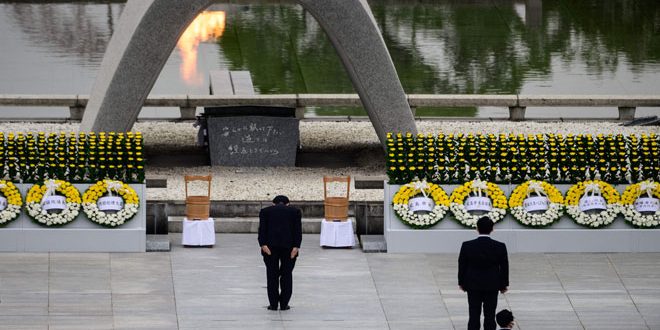Seventy-five years ago, the United States committed war crimes against the Japanese people on a scale that was previously unimaginable in human history.
On August 6, 1945, the United States dropped an atomic bomb on Hiroshima, Japan. Three days later, the United States dropped an atomic bomb on a second Japanese city, Nagasaki.
The death toll itself was mind-boggling. As many as 140,000 people ultimately died from the blast, but not all perished immediately. The residual health issues caused by intense radioactive fallout claimed thousands of lives in the months and years afterwards as well.
The world’s first nuclear bomb used against civilians went off at 08:15 local time in the southwestern city of Hiroshima.
The bomb nicknamed “Little Boy” immediately killed 80,000 people, according to initial estimates. This represented around 30 per cent of the population at that time.
By the end of the 1945, it was estimated that 140,000 people died. Thousands more died in the following years due to radiation-related injuries.
The US B-29 “Enola Gay” was the warplane that dropped the bomb, which is estimated to have destroyed 70 per cent of the city.
The bomb was built with uranium-235, the only fissile natural isotope of uranium. The explosion was the equivalent of 16 kilotons of TNT.
At 11:02 am local time, the US dropped another bomb called “Fat Man” over Nagasaki.
The detonation was equivalent to 21 kilotons of TNT. More than 40 per cent of the city was destroyed, with 40,000 people immediately killed. That number rose to over 74,000 victims in the following months.
Today, Japan marked 75 years since the world’s first atomic bomb attack, with the coronavirus pandemic forcing a scaling back of ceremonies to remember the victims.
Survivors, relatives and a handful of foreign dignitaries attended this year’s main event in Hiroshima to pray for those killed or wounded in the bombing and call for world peace.
Participants, many of them dressed in black and wearing face masks, offered a silent prayer at exactly 8:15 am, the time the first nuclear weapon used in wartime was dropped over the city.
The United States owes Hiroshima and Nagasaki an apology for committing atrocities against their citizens, but an apology is not enough. It’s a symbolic gesture, empty without a commitment to concrete action to ensure that such atrocities never occur again.
The United States owes the rest of the world a solemn promise to act to prevent the use of nuclear weapons and to engage in tangible steps toward their elimination.
Compiled by: Basma Qaddour

